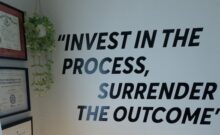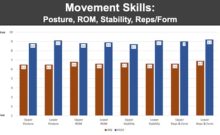
I get asked every single day why I have a Masters degree in Business (MBA). “Why does someone who teaches people to move and eat need a business degree?” they ask.
Aside from the fact that I believe all formal education is a good investment in yourself, I am starting to believe more and more that my business background is the #1 key that is making me a good coach and allowing me to help so many people achieve their health and performance goals. I think drawing on lessons from another industry gives me a very unique take at coaching.
Here are 5 super important things that business and sport have in common:
- It’s all about resource allocation
Business is all about the efficient allocation of money. You start every quarter with a certain budget. You distribute that budget in a way that you believe will propel your business forward (x amount to accounting, x amount to procurement, etc.).
In sport, you budget energy. At the beginning of every training block you start with a full tank of energy. Your role as a coach is to expend energy in a way that will make your athlete better (x amount to strength training, x amount to technical development, etc).
2. Competition drives growth
In business school we did a case study on Zara, one of the world’s leading fast fashion retailers. In this hyper-competitive and traditionally narrow margin industry, Zara emerged by solving a couple key things related to their supply chain and distribution. This allowed them to deliver fast, remain trendy, and keep exceptional margins, where it would otherwise not have been possible.
The same is true in sport. I was NB provincial champion my entire junior career. I thought I was pretty good. Then I started playing nationally and realized my game meant nothing. Then I did well nationally and start playing internationally and realized again my game meant nothing. While I never reached a true “world class” state, playing at these higher and higher levels forced me to fix holes in my game that I would not otherwise have done if I had not stepped foot outside of New Brunswick.
3. The Power of Teamwork (1 + 1 = 3)
I’ve said this before on this blog, but I am such a huge believer in team work I can’t say it enough. The best business partners are the ones with different but complementary strengths. The best business relationships are the ones which are mutually beneficial to the customer and the business.
Nine years of my badminton career was me trying to do everything. I was planning my own strength training (via youtube), I was booking my own flights, I was planning my tournaments, etc. Late in my badminton career, I started hiring and working with true professionals. My performance skyrocketed. I realized that I could never replicate the passion, knowledge, experience, and enthusiasm of a true strength coach, and it was well worth it for me to pay them to do their job.
4. It’s a science and an art
Business and sport are both science and art, and anyone who says it’s exclusively one or the other likely hasn’t experienced the nuance and complexity that goes on at the highest levels.
I am about as data oriented as anyone, but data alone cannot make decisions for us. All of my best business mentors would agree that data only provides context, and ultimately people need to make decisions. I feel the same about sport. You can have every meso and micro cycle planned to perfection, the most beautiful undulation of volume and intensity, and the most precise heart rate variability spreadsheet, but if your athlete walks in and tells you they feel like shit, you need to adjust.
5. Strategy rules
Netflix’s focus on streaming service allows them to keep costs down (relative to bricks and mortar stores) and continually reinvest in unique and captivating content. Amazon’s expansive distribution system allows them to serve customers with remarkable speed and price. Apple’s cutting edge marketing allows them to charge more and engrain you in their “ecosystem.” All of these companies are successful because of a series of strategic decisions.
The same is true in sport. 99.99% of athletes just show up and do what they are told with no thought as to why or what they should be doing, or how they envision their game developing. But the best in the world are thoughtful and absolutely meticulous about the work they are doing. Not a single thing skips them.





